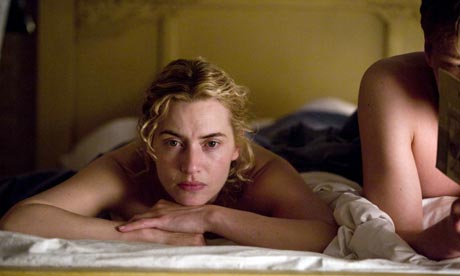
Last month Vanity Fair asked Kate Winslet if she'd like an Oscar. She would, she said. In fact she said: "You bet your fucking ass."
There's bound to have been an actress who wanted an Academy award more desperately than Winslet. But there's surely never been one who's fessed up to the desire more frankly.
That big, gold shadow has long hung over her, from the moment she became, at 22, the youngest woman to receive two Oscar nominations. Currently, her tally is five. But if Academy voters follow in the footsteps of the foreign press who tick the forms for the Golden Globes, then she'll rack up another couple - making her the youngest ever actress to have gained seven.
Ever the practical-minded gal, Winslet has been forthright about the prize-pressure under which she finds herself. Remember her spoofy turn in the first series of Extras, playing herself, playing a nun under Nazi occupation – purely, she says, with the intention of getting her paws on a little yellow man?
This year, she's taking a belt-and-braces approach, giving barnstorming performances in both Revolutionary Road and The Reader. Both are films with Oscar firmly in their crosshairs: released at exactly the right time of year, adapted from acclaimed novels (by Richard Yates and Bernard Schlink respectively), and directed by Brit heavyweights (Winslet's husband, Sam Mendes, and Stephen Daldry).
In the former she plays an emergent feminist battling husband Leonardo DiCaprio in 50s suburbia (the film plays like some fantastically mannered east-coast episode of Eastenders). And in The Reader (rather remarkably, in light of her Extras turn) she's an ex-Nazi prison guard who has a fling with a schoolboy who's keen on reading to her in the bedroom.
It's a performance that's already stoked controversy for the full-frontal scenes deemed by some critics to cast Nazis in too sexy a light. And, indeed, there is something amusingly porn-ish about the initial erotic encounter (naughty schoolboy fetches older lady some coal, gets mucky, has a bath, etc).
But that controversy looks now to be overshadowed by a more prosaic one. Winslet is being put forward by the film's distributors not for the best actress accolade, but best supporting actress. It seems, if you've seen the film, like potty logic. She's unquestionably the star: the joint chief character, the actor with the most screen time, the centre of the whole enterprise.
In an excellent piece on spout.com, Christopher Campbell discusses the ins and outs of the Weinstein brothers' decision; the precedents and the rules. Could it be because she's guaranteed a best actress nod on Revolutionary Road?
What do you think? Does it matter? And what of the Golden Globe noms in general? Any notable omissions? Or are they just a wearisome warm-up for the main event?

